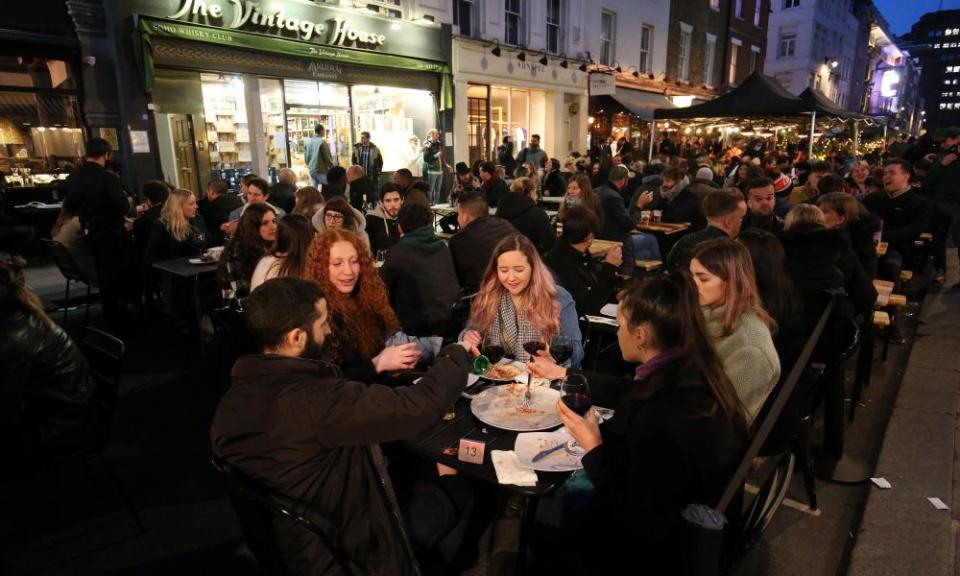As England enters a world of pre-booked fun, spare a thought for the disorganised

Lockdown is almost over but I don’t feel excited. I have no plans. I will not be swimming in a lido or roaring with laughter at the pub; my hair will continue to bloom outwards like a horrible mushroom. Instead, I find myself barred from the public sphere. Everywhere has already been booked, which represents a crushing victory for my ideological enemies: people who have the foresight to plan things in advance.
My brain just doesn’t function in a way that allows me to thrive in such a world. I am someone who spent a whole year of university with a broken front tooth because I couldn’t get round to booking a dentist appointment. (When I finally got it fixed, I decided to treat myself to a Wham bar on the walk home and immediately broke it again.)
Put simply, we are about to see what happens to culture when “being good at administrative tasks” becomes a condition of leaving the house. Those who stand to benefit are highly organised go-getters with stable incomes and orderly lives – the kind of people who’ll visit a gastropub famous for its terrine and think, “Yes ... this is the perfect venue for my four-year-old’s birthday party.” People who enjoy Secret Cinema and spend their weekends scrolling through Time Out in search of “something a little bit different”. Couples who cut their wedding cake with a sword.
I don’t believe the advance bookers really enjoy going to the pub at all. It’s just an activity, a day out, an opportunity to socialise with their loved ones after several months of enforced isolation. For me, on the other hand, it is a way of life. They merely adopted the pub; I was born in it, moulded by it (note: I was not born in a pub). I have nothing against these people, this demographic I’ve just invented, but the point is they are already life’s winners. They already have so much. Can’t they leave the rest of us to our grotty, spontaneous little nights out?
Beyond my animosity towards everyone who has their life together, what’s really at stake is the death of spontaneity. Deciding to duck into a pub for a solo pint used to be an act of carefree whimsy. When you have to book a table, however, drinking alone starts to feel dedicated and more than a little shameful. In this context, having to utter the phrase “A table for one, please” feels like a terrible affront to human dignity. All I want is to be able to move through the world with the same ease I did before, and occasionally be surprised by what I end up doing.
While I reject the cliche that organised fun is inherently worse, spontaneity is a large part of what makes going out so pleasurable. As Jeremy Atherton Lin writes in his recent memoir, Gay Bar, the experience of marauding between bars is just as important as the destination: “The cold night was a sea – and as much a part of the revelry as the ports.” We’re losing the sense of freedom that comes with heading out into the city at night, feeling like the protagonist of a Pet Shop Boys song.
None of this matters if the shift towards booking is a temporary measure. But I’m not convinced this will be the case. For as long as I’ve lived in London, it’s become harder and harder to do anything without planning ahead. There’s been a shift towards a less spontaneous nightlife, from clubs you could wander into any night of the week to monthly or even quarterly events, many of which are located in ever more peripheral places. Amid widespread venue closures, a more organised and infantilising culture has emerged, turning the city into an oversized creche of urban axe-throwing, escape rooms and grime-themed brunches – the commodified “experience” model of socialising. These are not usually the kinds of events you can just turn up to, even if you really wanted to. Spontaneity is an urban ideal we were already losing; the pandemic is just accelerating it.
Perhaps some venues will cater to the wanderers. The booking model already varies from venue to venue, and this is likely to continue into the future, with some pubs limiting the number of pre-booked tables to make room for people walking in and others fully committing to being quasi-restaurants. If the advance bookers versus the walk-in crowd is to become a new culture war, there’ll be mess halls willing to cater to both sides.
At some point, hopefully, a degree of spontaneity will return to our cities. People who like going to the pub will go to the pub, and people who don’t will be able to go elsewhere. The Alice in Wonderland tea parties, prison-themed cocktail bars and adult ball pits will eventually return. Until that point, lockdown won’t really be over.
James Greig writes about culture and society

 Yahoo Finance
Yahoo Finance 